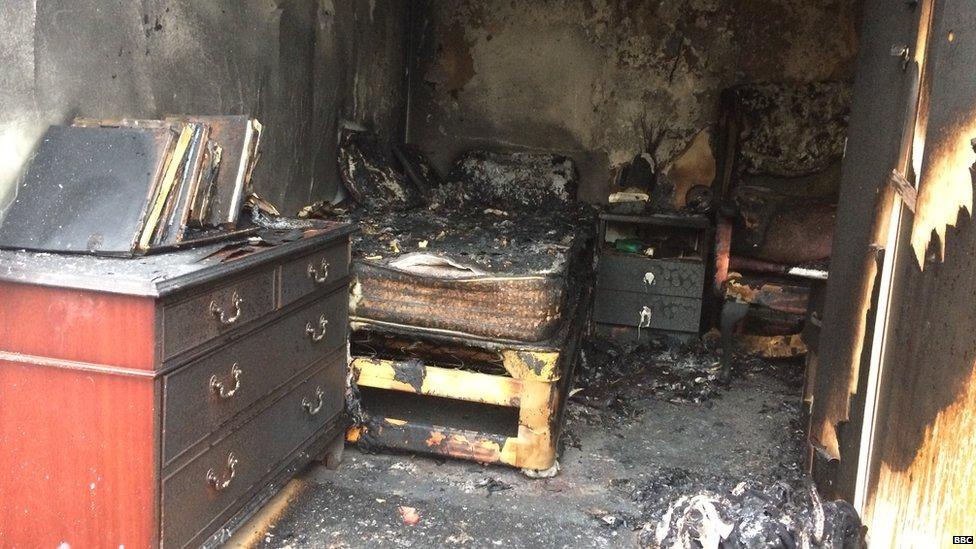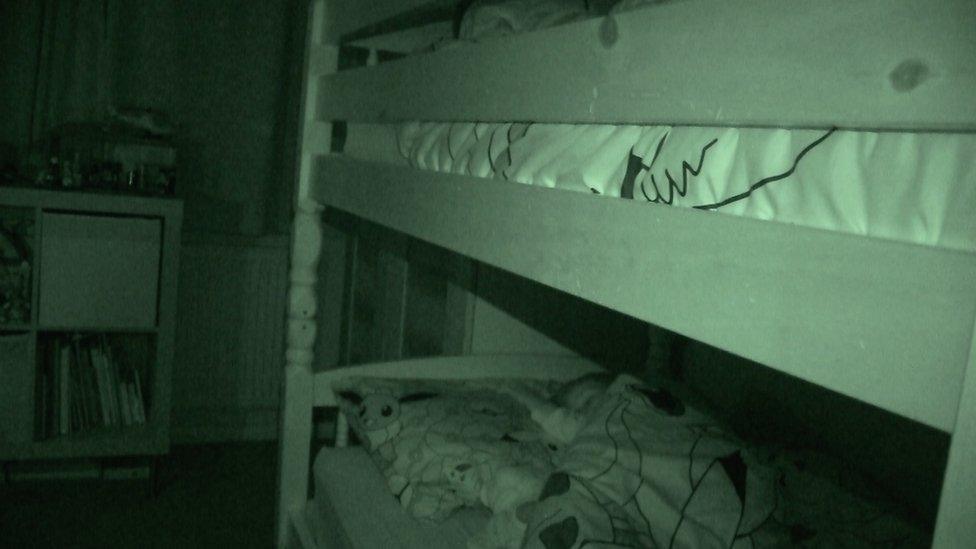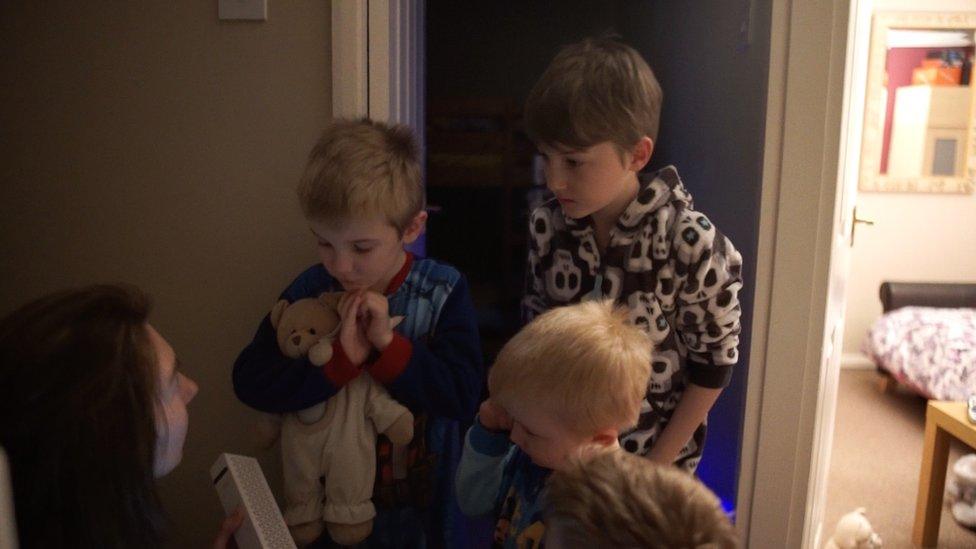Smoke alarms 'fail to wake children'
- Published
In a trial, children responded better to an alarm with a woman's voice
Forensic scientists and fire investigators have warned that smoke alarms may not wake children.
Research by Dundee University and Derbyshire Fire and Rescue found that of 34 children tested, 27 repeatedly slept through smoke detector alarms.
They have developed an alarm with a lower pitch and a woman's voice, which issues a warning: "Wake up, the house is on fire."
They now want 500 families to test, external the new alarm.
Prof Niamh Nic Daeid, a forensic scientist at Dundee, said: "Boys are especially hard to wake, and we think they will respond to a human voice."
Standard smoke alarms have a frequency of around 3,000Hz, but the prototype has a lower pitch of 520Hz, to which young children are more likely to respond.

In this test blaze, the smoke alarm gave plenty of warning - but would it have woken a child?
Dave Coss, watch manager at Derbyshire Fire and Rescue Service, got involved in the research after the deaths of six children in a house fire in Derby in 2012, which was started deliberately by their parents.
The children, aged five to 13, all slept through the sound of smoke alarms.
Mick Philpott was jailed for life for manslaughter, while his wife, Mairead, and an accomplice were sentenced to 17 years.
Mr Coss told me: "When we investigated this tragic case, we thought the children may have been incapacitated in some way and prevented from getting up, as all were found in their beds."
He said that toxicology reports proved negative, so the only other option was that "the children didn't respond to the smoke detector and just carried on sleeping".
Mr Coss and Prof Nic Daeid conducted tests involving smoke alarms in the homes of 34 children aged between two and 13.
Each child was tested six times in their own home and were not warned that the smoke alarm was to be set off.
Twenty-seven children slept through the alarms on all six tests. Seven children, all girls, woke at least once.
None of the boys woke during the tests.

Melanie and Stuart have four boys and say only one has ever woken during a test of their standard smoke alarm
Among the children tested were the four boys of Melanie and Stuart Wilkins, who are aged three to 13.
Melanie is the niece of Mr Coss, who contacted her to help in the research.
Melanie told me that Jack, 13, Daniel, 10, Lewis, seven, and Oscar, three, had been repeatedly tested and had never woken up when she had activated the smoke alarm.
Experimental alarm
The BBC filmed at night with the Wilkins family. Daniel was the only child to wake up when Melanie set off the smoke alarm in the hall landing.
Smoke alarms are required to reach 85 decibels at 3m (10ft).
The portable speaker used to play the experimental alarm is not as loud, so in order to make a comparison Melanie needed to open the boys' bedroom doors.

Melanie reassures her four sons after the prototype smoke alarm wakes them
When Melanie set off the new sound alert, all four boys woke up immediately.
She told me: "Your children are like gold, they're the most precious things. I didn't think in a million years that our smoke alarm would not wake them up."
Melanie thought the voice recording of a woman's voice was an excellent idea.
She said: "It's like the voice of a parent that they are used to listening to day-in and day-out and maybe subconsciously that is what they hear when the alarm goes off."
Researchers at Dundee say there are several theories they were exploring as to why standard smoke alarms may not wake children.
Rodney Mountain, from the University's School of Medicine, said: "Children's hearing ability, brain function, sleep patterns and stage of brain development is very different to adults.
"We are programmed to respond to human voices warning of danger, such as a mother's voice shouting to warn a child.
"Children are not born pre-programmed for our modern world of danger warning sounds from digital beeps and sirens - they have to learn, recognise and interpret these sounds."
Families needed
Some 500 families from across the UK with children aged between two and 16 are being sought to take part in a trial , externalcomparing standard smoke alarms with the new sound.
Prof Nic Daeid said: "Protecting our children in the event of fire is so fundamentally important that we want to involve parents and their children in expanding this research."
The researchers said it was important the study did not undermine the need for every home to be fitted with smoke alarms, as these will wake adults and had a proven record in saving lives.
The Fire Industry Association, which represents manufacturers of smoke alarms, said it had done no specific research with a focus on children but there were different types of alarm available, such as vibrating pads that could fit under a pillow, for those with hearing problems.
The Chief Fire Officers Association said it was "crucial" that people tested their smoke alarms regularly, adding: "As this research does indicate that some children may not wake to the sound of a smoke alarm, parents, guardians and responsible adults should ensure that they prepare an escape plan which must account for this.
"Children must woken and evacuated as part of this plan."
Follow Fergus on Twitter, external
- Published26 June 2013

- Published4 April 2013
